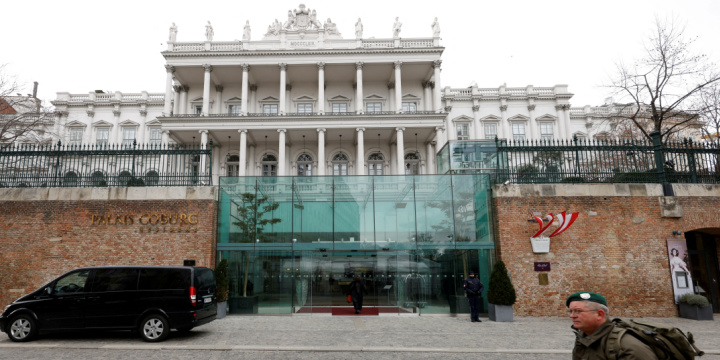Mossad Chief to Present Washington With Intelligence on Emerging Nuclear Deal With Iran
 by Sharon Wrobel
by Sharon Wrobel

Palais Coburg in Vienna where negotiations to revive the 2015 Iran nuclear deal are being held. Photo: Reuters/Leonhard Foeger
Mossad Director David Barnea is expected to travel to Washington next week to present Israel’s intelligence position against a return to the emerging nuclear agreement between Iran and Western powers.
Barnea will be the third senior Israeli official in recent days to travel to Washington to meet with US officials to share intelligence and concerns about the dangers of the emerging nuclear agreement. Over the weekend, Israel’s Defense Minister Benny Gantz met with US National Security Adviser Jake Sullivan after national security adviser Eyal Hulata concluded his visit to Washington last week. Israeli government officials have said that the efforts have already borne some fruit as a few points which would have caused damage to Israel and the world have been excluded from the draft agreement.
Earlier in the week, Barnea warned that the emerging nuclear deal with Iran is a “strategic disaster” which “gives Iran a license to manufacture a bomb.”
Israeli senior government officials have clarified in recent days to the Biden administration that the country will not be bound by a nuclear deal with Iran and will define where its own red lines are based on intelligence material.
“The IDF and the Mossad have been instructed to be prepared for any scenario,” Prime Minister Yair Lapid was quoted as saying during a press briefing to Israeli media.. “We will be prepared to act to maintain Israel’s security.”
“The Americans understand this, the world understands this, and Israeli society should also know it,” he added.
Israel increased its diplomatic efforts in recent weeks as the indirect talks between the US and Western powers to reach an agreement to salvage Iran’s 2015 nuclear deal – known as the Joint Comprehensive Plan of Action (JCPOA) – appeared to be drawing to a close, following more than 16 months of negotiations. The JCPAO offered sanctions relief to Iran in exchange for limits on its nuclear program.
“For more than a year, Israel has been waging a multi-systemic political struggle aimed at preventing the re-signing of the nuclear agreement with Iran,” Lapid said. “We are making a coordinated effort to make sure that Americans and Europeans understand the dangers involved in the agreement.”
However, Lapid emphasized that Israel does not oppose an agreement per se, but that the current draft agreement is “bad” and argued that a better deal could only be reached if a credible military threat was put on the table so that the Iranians understand that their refusal and their deceptions carry a heavy price.
“It is possible and necessary to get the Iranians to sign a much better agreement, which will be without an end date, with tighter oversight, and which will also deal with Iran’s ballistic missile program and its involvement in terrorism in the Middle East,” Lapid said.
“The agreement was not good when it was signed in 2015,” Lapid remarked. “Today the dangers inherent in it are even greater and Iran is in a different place technologically.”
“A good deal is an agreement that does not inject $100 billion a year into Iran and an agreement that will last forever, so that Iran will not have nuclear weapons,” an unnamed Israeli government official told Israeli news portal N12. “Until Iran becomes a peace-loving country, I suggest minimizing the money that goes in there.”
 Iran Sentences Rapper Toomaj Salehi to Death Over 2022-23 Unrest
Iran Sentences Rapper Toomaj Salehi to Death Over 2022-23 Unrest Netanyahu: ‘Antisemitic Mobs Have Taken Over Leading U.S. Universities’
Netanyahu: ‘Antisemitic Mobs Have Taken Over Leading U.S. Universities’ U.S. Decides Against Sanctions on IDF’s Netzah Yehuda Battalion
U.S. Decides Against Sanctions on IDF’s Netzah Yehuda Battalion Israel Says It Is Poised to Move on Rafah
Israel Says It Is Poised to Move on Rafah Israeli Hostage Hersh Goldberg-Polin Seen Alive in a New Hamas Video
Israeli Hostage Hersh Goldberg-Polin Seen Alive in a New Hamas Video Palestinian Prime Minister Announces New Reform Package
Palestinian Prime Minister Announces New Reform Package France: Man Suspected of Abducting, Raping Jewish Woman ‘to Avenge Palestine’
France: Man Suspected of Abducting, Raping Jewish Woman ‘to Avenge Palestine’ Israel Intensifies Strikes Across Gaza, Orders New Evacuations in North
Israel Intensifies Strikes Across Gaza, Orders New Evacuations in North Iran Threatens to Annihilate Israel Should It Launch a Major Attack
Iran Threatens to Annihilate Israel Should It Launch a Major Attack ‘Completely Baseless’: Reports of Mass Graves at Gaza Hospitals are False, IDF Says
‘Completely Baseless’: Reports of Mass Graves at Gaza Hospitals are False, IDF Says



 Israeli Hostage Hersh Goldberg-Polin Seen Alive in a New Hamas Video
Israeli Hostage Hersh Goldberg-Polin Seen Alive in a New Hamas Video Israel Says It Is Poised to Move on Rafah
Israel Says It Is Poised to Move on Rafah U.S. Decides Against Sanctions on IDF’s Netzah Yehuda Battalion
U.S. Decides Against Sanctions on IDF’s Netzah Yehuda Battalion Netanyahu: ‘Antisemitic Mobs Have Taken Over Leading U.S. Universities’
Netanyahu: ‘Antisemitic Mobs Have Taken Over Leading U.S. Universities’ Iran Sentences Rapper Toomaj Salehi to Death Over 2022-23 Unrest
Iran Sentences Rapper Toomaj Salehi to Death Over 2022-23 Unrest